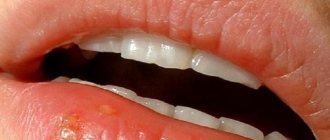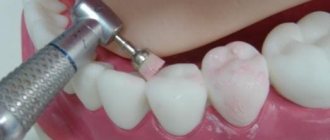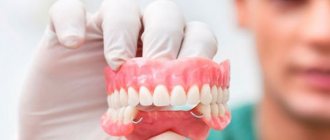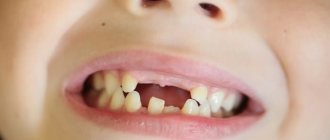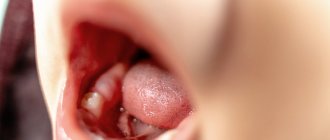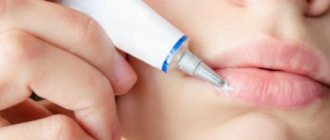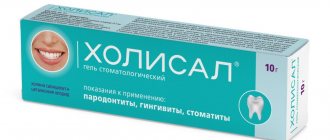Types of herpes in children
It is worth distinguishing between herpes simplex viruses type 1. This is the most well-known type of herpes simplex virus, which appears on a child's lip and is characterized by a general malaise, sometimes with a slight fever. Oral ulcers are most common in children aged 1-2 years, but they can appear in people as young as at any age and at any time of the year.
A crust on the lip of a child with herpes. Photo: victoriafly / freepik.com
The second type of herpes is genital, which manifests itself in a similar way. During childbirth, if the mother suffers from genital herpes, the baby may become infected as it passes through the birth canal. The manifestations of this type of herpes in children are more complex than in adults. Children may suffer from herpetic sore throat and stomatitis.
Herpes virus type 3 (varicella zoster virus) in children during primary infection causes chickenpox; in the secondary manifestation of the virus, the disease occurs as herpes zoster (shingles).
Chickenpox. Photo: freepik.com
Herpes type 6 in children causes roseola infantile, a pink maculopapular rash. It mainly affects children under the age of 2 years. First, a fever develops, then the temperature decreases within 3-6 days. After the temperature drops, an exanthema appears on the skin - pink maculopapular rashes 1-3 mm in size, turning pale when pressed (this is one of the distinctive signs; for the same rubella, the rash does not turn pale after pressure). They may disappear within a few hours or may persist for up to several days. The rash is localized mainly on the body, spreading to the neck, face and limbs
Infantile roseola. Photo: (Public Domain)
Herpetic viruses of types 4, 5, 6 can cause infectious mononucleosis - an acute infectious disease characterized by fever, sore throat, enlarged lymph nodes, liver and spleen, lymphocytosis, and the appearance of atypical mononuclear cells in the peripheral blood.
Cytomegalovirus, a member of the herpesvirus type 6 family, is one of the most common viruses. Children usually become infected with cytomegalovirus infection in early childhood, for example, in a nursery or kindergarten. Transmission of cytomegalovirus can only occur through direct contact with an infected person. In addition, children can be infected with the virus during fetal development. The infected environment is blood, urine, saliva and other biological substrates. Typically, cytomegalovirus in healthy children is asymptomatic or accompanied by minor symptoms similar to those of mononucleosis and disappearing after a few days or weeks.
Enlarged lymph nodes in the neck of a child with infectious mononucleosis. Photo: GMS current topics in otorhinolaryngology, head and neck surgery / Open-i (CC BY-NC-ND 3.0)
Human herpesvirus type 6 and type 7 during primary infection causes neonatal exanthema in infants. Only a specialist can accurately diagnose a child’s health condition.
Drug treatment
One of the most common misconceptions is that herpes is treated with antibiotics. None of the viral infections are treated with penicillin. In fact, treatment is carried out using antiherpetic drugs.
Modern pharmacology can offer an impressive list of effective drugs that are aimed at fighting the virus.
Schemes designed for the comprehensive fight against herpes are developed by a doctor for each individual individually, based on the method of penetration of the virus into the body, the severity and form of the disease.
The medicinal substance – Ciclovir – is an “ambulance” at the first symptoms.
This group includes the following drugs:
- Acyclovir;
- Famciclovir (Famvir);
- Penciclovir (Vectavir);
- Panavir.
Herpes in infants
Herpes in children can be more complex than in adults. Herpes is an insidious infection; herpes in an infant can cause severe damage to the nervous system and internal organs. When the visual organs are damaged, keratitis, phlebothrombosis, chorioretinitis, and iridocyclitis occur. If the ENT organs are damaged, sudden deafness, herpetic sore throat and damage to the inner ear may occur. Damage to the cardiovascular system manifests itself in the form of myocarditis, atherosclerosis and myocardiopathy. If the herpes virus penetrates the central nervous system, there is a risk of encephalopathy, meningitis, and nerve plexuses are affected. Herpes can also lead to schizophrenia and depressive disorders. On the part of the reproductive system, reproductive function, urethritis, prostatitis (in men), colpitis, endometritis and chorionitis (in women) are possible.
How to treat if the child is only one year old
Since a child’s weakened immune system becomes a convenient prey for various infections, treatment of one-year-old babies begins with the prescription of immunostimulants and antiviral agents in combination.
Only in this way will the herpes virus not be able to spread throughout the body, causing serious problems.
Alternating temperatures will help stop the growth of skin rashes - first apply a corner of a towel dipped in hot water, and then a piece of ice. Severe itching will be relieved by iodine, brilliant green or zinc paste.
Do not under any circumstances squeeze the rash or pick off the dried crust at the final stage of recovery!
Herpes symptoms
Symptoms of herpes in children are traditional: there may be fever, fatigue, muscle pain, and irritability. Pain, burning, tingling and itching occur at the site of future infection rashes. The rash is accompanied by subsequent ulceration and the formation of wounds. Children tend to scratch wounds until they bleed, constantly touch them, and tear off the crusts that have formed, which complicates healing and prolongs its duration. At best, simple herpes on a child's lip heals within a few days. Ulcers can also occur in the mouth: on the gums, the front of the tongue, the inside of the cheeks, the throat and the roof of the mouth. The gums may be slightly swollen, red, and may bleed. They may also spread down the chin and neck. The lymph nodes in the neck often become swollen and painful. In children, the herpes virus can infect the mucous membrane of the throat with the formation of small ulcers and a grayish coating on the tonsils. Because the ulcers are painful, it may be difficult to eat or drink. A sick child should not eat solid or hot foods during the period of oral herpes. If the wound is constantly injured, healing may take two weeks or more. Parents need to control this process.
Drugs
One of the reasons for the appearance of herpes is a decrease in the body’s defenses and a change in their activity.
Correction of the immune system is a very important part of treatment, which involves the use of:
- immunoglobulin - it has antitoxic and immunomodulatory effects. Such drugs are: Groprinosin, Immunal, Arpetol.
- interferon – it has an immunoregulatory and antiproliferative (activates immune cells) effect. In medical practice the following are used: Herpferon, Amiksin, Cycloferon, Kagocel.
These drugs can effectively relieve the symptoms of herpes and prevent its reappearance for a long time.
Treatment of herpes in children
To treat herpes infection, antiviral drugs, immunostimulants, and interferons are used. Treatment of infection must begin at the first suspicion of the disease, recovery depends on this, advanced infection becomes chronic or recurrent, and the likelihood of complications increases. Treatment of herpes in children is aimed at minimizing the manifestation of symptoms and suppressing the activity of the virus. For this purpose, antiviral drugs are used - ointments and tablets that relieve itching and pain. It is necessary to take large amounts of fluid, as well as antipyretics when body temperature rises to high levels.
Photo: MedPortal
An antiviral drug used for herpes infection is acyclovir. This drug can be used either as an intravenous injection or as tablets. The method of administration of the drug depends on the severity of the disease and its form. The drug is administered intravenously at a dosage of 30-60 mg/kg of the child’s body weight, orally – 90 mg/kg. Taking the drug should be divided into 3-4 parts. This drug can also be used externally in the form of an ointment. It must be applied to the affected areas of the skin and mucous membranes 4-5 times a day.
Immunostimulating drugs help the child’s body fight the virus more effectively and prevent the virus from infecting new areas of the mucous membranes and internal organs. For treatment, you can use immunostimulating drugs such as Immunal, Groprinosin, Arpetol.
Interferons help destroy viruses and prevent them from multiplying uncontrollably. They can be used both in tablet form and in the form of suppositories. Suppositories are inserted into the child's anus 2 times a day for 5 days, the course is repeated 2-3 times with a break of 5 days.
If the disease recurs quite often, you need to contact an immunologist who will give qualified advice that can significantly increase the immunity of a weakened child. Among other things, treatment of herpes in children should be supervised by a doctor, since only a specialist can calculate the correct dosage that is safe for the child’s body.
The herpes virus, once in a child’s body, remains in it for life, periodically exacerbating, causing temporary discomfort. The main task of parents is to help the child, strictly following the instructions of the pediatrician. When solving an existing problem, special attention is paid to maintaining hygiene and providing the baby with individual means, such as a towel, soap, and a washcloth. The child should wash his hands more often. If there is herpes in the mouth, the child should not be allowed to injure herpes sores.
What not to do when the temperature rises
- Do not undress your child or cool him or her with blows or rubs; fever is a natural and healthy response to infection. Hypothermia can lead to complications from the infection.
- Do not cover your baby with a warm blanket or wrap him up, as this may cause heat stroke. Just cover your baby with a sheet or light blanket.
- Do not give aspirin to children under 16 years of age. Absolutely never! This may be due to a rare but dangerous disease called Reye's syndrome.
- In children under one year of age, medications available in the form of rectal suppositories are recommended to reduce fever.
- Do not self-medicate. For young children, the dose of drugs and the frequency of their use should be calculated individually; the prescription can only be made by a doctor after diagnosis.
Sources
- Lenart M., Działo E., Kluczewska A., Węglarczyk K., Szaflarska A., Rutkowska-Zapała M., Surmiak M., Sanak M., Pituch-Noworolska A., Siedlar M. miRNA Regulation of NK Cells Antiviral Response in Children With Severe and/or Recurrent Herpes Simplex Virus Infections. // Front Immunol - 2022 - Vol11 - NNULL - p.589866; PMID:33679688
- Gündoğdu M., Erden N., Karagun E., Acıpayam AŞF., Vural S. Annual pattern and clinical characteristics of herpes zoster in immunocompetent children in a rural area. // Dermatol Ther - 2022 - Vol34 - N1 - p.e14570; PMID:33219711
- Huang CW., Hsieh CH., Lin MR., Huang YC. Clinical features of gingivostomatitis due to primary infection of herpes simplex virus in children. // BMC Infect Dis - 2022 - Vol20 - N1 - p.782; PMID:33081701
- Cosme I., Ramírez MA., Peñata CA., Beltrán-Arroyave C., Florez ID. Human Herpes Virus 6 Detection in Children With Suspected Central Nervous System Infection. // Pediatr Infect Dis J - 2022 - Vol39 - N12 - p.e469-e471; PMID:32925539
- Weinmann S., Irving SA., Koppolu P., Naleway AL., Belongia EA., Hambidge SJ., Jackson ML., Klein NP., Lewin B., Liles E., Marin M., Smith N., Weintraub E. ., Chun C. Incidence of herpes zoster among varicella-vaccinated children, by number of vaccine doses and simultaneous administration of measles, mumps, and rubella vaccine. // Vaccine - 2022 - Vol38 - N37 - p.5880-5884; PMID:32444193
- Kanamori K., Shoji K., Kinoshita N., Ishiguro A., Miyairi I. Complications of herpes zoster in children. // Pediatr Int - 2022 - Vol61 - N12 - p.1216-1220; PMID:31628883
- Aktaş H., Erdal SA., Güvenç U. Herpes Zoster in children: Evaluation of the sixty cases. // Dermatol Ther - 2022 - Vol32 - N6 - p.e13087; PMID:31515892
- Hwang JH., Kim KH., Han SB., Kim HH., Kim JH., Lee SY., Choi UY., Kang JH. A clinical-epidemiological multicenter study of herpes zoster in immunocompetent and immunocompromised hospitalized children. // Clin Exp Vaccine Res - 2022 - Vol8 - N2 - p.116-123; PMID:31406693
- Agharbi FZ. . // Pan Afr Med J - 2022 - Vol32 - NNULL - p.199; PMID:31312311
- Pittet LF., Curtis N. Does oral antiviral suppressive therapy prevent recurrent herpes labialis in children? // Arch Dis Child - 2019 - Vol104 - N9 - p.916-919; PMID:31311776

